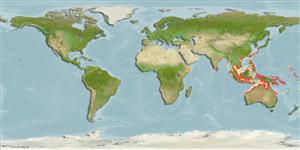sub class Elasmobranchii (ฉลามและกระเบน) (sharks and rays) >
Myliobatiformes (Stingrays) >
Dasyatidae (Stingrays) > Urogymninae
Etymology: Himantura: Greek, iman, imantos = thong, strap + Greek, oura = tail (Ref. 45335).
More on author: Bleeker.
Environment: milieu / climate zone / depth range / distribution range
นิเวศวิทยา
เกี่ยวกับทะเล,น้ำเค็ม สัตว์น้ำหน้าดิน. Tropical; 30°N - 24°S
Indo-West Pacific: Bay of Bengal to New Guinea, north to the Ryukyu Islands, south to northern Australia. Not occurring in the western Indian Ocean.
Length at first maturity / ขนาด / น้ำหนัก / Age
Maturity: Lm 87.5, range 85 - 90 cm
Max length : 410 cm TL เพศผู้/กระเทย; (Ref. 9840)
Demersal on soft substrate inshore (Ref.58048). Ovoviviparous (Ref. 50449). Size at birth about 20 cm WD and 92 cm TL (Ref. 90102). Caught occasionally in the demersal tangle net, bottom trawl and longline fisheries. Utilized for its meat, skin (high value) and cartilage (Ref.58048).
Life cycle and mating behavior
Maturities | การสืบพันธุ์ | Spawnings | Egg(s) | Fecundities | ตัวอ่อน
Exhibit ovoviparity (aplacental viviparity), with embryos feeding initially on yolk, then receiving additional nourishment from the mother by indirect absorption of uterine fluid enriched with mucus, fat or protein through specialised structures (Ref. 50449). Distinct pairing with embrace (Ref. 205). Distinct pairing with embrace (Ref. 205).
Last, P.R. and J.D. Stevens, 1994. Sharks and rays of Australia. CSIRO, Australia. 513 p. (Ref. 6871)
IUCN Red List Status (Ref. 130435)
Threat to humans
Venomous
Human uses
การประมง: มีการค้าเพียงเล็กน้อย
เครื่องมือ
Special reports
Download XML
แหล่งที่มาจากอินเตอร์เน็ต
Estimates based on models
Preferred temperature (Ref.
123201): 25 - 29, mean 28.3 °C (based on 810 cells).
Phylogenetic diversity index (Ref.
82804): PD
50 = 0.5000 [Uniqueness, from 0.5 = low to 2.0 = high].
Bayesian length-weight: a=0.00832 (0.00366 - 0.01891), b=3.10 (2.90 - 3.30), in cm total length, based on LWR estimates for this (Sub)family-body shape (Ref.
93245).
ระดับชั้นอาหาร (Ref.
69278): 3.6 ±0.5 se; based on size and trophs of closest relatives
Fishing Vulnerability (Ref.
59153): Very high vulnerability (90 of 100).
